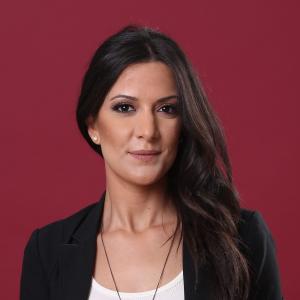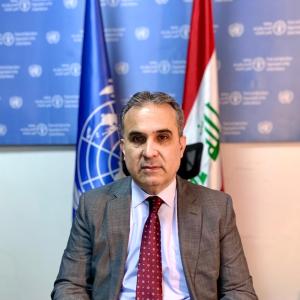FAO Empowers Rural Women to Lead Climate Action in Iraq
15 May 2025
Erbil, 14 May 2025 – Building on the momentum of the Climate Wise Women (CWW) Module 1 training held in Basra, the Food and Agriculture Organization of the United Nations (FAO), with funding from the Swedish International Development Cooperation Agency (SIDA), has concluded a six-day Intensive Training of Trainers (TOT) in Erbil. This l training marked a significant milestone in preparing Master Trainers—women leaders from Najaf, Muthanna, and Baghdad—to initiate, demonstrate, and spearhead community-level climate action across southern Iraq.

Delivered under the project “Enhance Climate Resilience of Vulnerable Agriculture Households in Southern Iraq”, the training, delivered by FAO Specialists, combined Modules 2 and 3 of the CWW curriculum into one comprehensive cycle. Participants were introduced to advanced concepts in climate-resilient irrigation and water management, sustainable soil-water-crop relationships, agrometeorological advisories, and resilient food systems technologies. Designed to be practical, locally adapted, and feasible for women smallholder farmers on the ground, the training equipped participants with both scientific tools and leadership skills to support rural women in their farms.
“This training demonstrates that women are at the heart of agricultural transformation in Iraq,” said Salah Hajj Hassan, FAO Representative in Iraq. “By equipping them with the tools and leadership skills to adapt to climate change, we are laying the foundation for resilient communities and sustainable food systems.”
The opening ceremony was attended by Dr. Hadi Al-Yasiri, Director General of the Horticulture Department at the Ministry of Agriculture, and Dr. Mohammed Mankhi, Director General of the Agricultural Mechanization Department. Both officials praised the initiative, emphasizing that empowering rural women with adequate knowledge and capacity to adapt to climate change is a strategic investment in Iraq’s agricultural future, and would foster climate resilience where it is most needed—within local communities."
This training followed earlier steps in the CWW initiative, including the successful TOT and the training of 50 local women facilitators from Najaf and Muthanna. These facilitators, have now established community-based women farmer groups, and will work closely with the Master Trainers to promote climate-smart agricultural practices tailored to the agro-climatic realities of the target communities, as well as to their adaptive capacities.
The training sessions concluded with a closing ceremony, during which the FAO team awarded certificates and celebrated the achievements of the Master Trainers—reaffirming the commitment of all partners to empowering rural women as agents of change in climate action.
With the scientific training phase now complete, the Climate Wise Women initiative is entering its field implementation stage. Local facilitators will begin cascading training sessions and conducting hands-on demonstrations using sets of field toolkits provided by FAO. Women farmer groups will be encouraged to engage in peer learning exchanges, form their own knowledge exchange groups, and deliver community awareness activities focused on sustainable water use and adaptive agriculture.
This transition to fieldwork is the result of three successful Training of Trainers (TOT) cycles, through which FAO has built a core group of capable women leaders ready to spearhead climate adaptation efforts. The Climate Wise Women initiative stands as a significant genuine example of how combining scientific expertise with local leadership can drive lasting change for communities most vulnerable to climate impacts.
By investing in rural women and building their capacity to lead climate action, the initiative directly contributes to several Sustainable Development Goals, including SDG 2 (Zero Hunger), SDG 5 (Gender Equality), SDG 6 (Clean Water and Sanitation), and SDG 13 (Climate Action). It strengthens the nexus between environmental sustainability, gender empowerment, and food security in fragile settings.


He started his career in 1984, as Senior Research Assistant in the Agricultural Research and Education Centre (AREC), American University of Beirut. From 1987 to 1991, he was Coordinator of the Student Training Programme, and also Agriculture and Horticultural Teacher for the Faculty of Agriculture, at the Lebanese University.
From 1991 to 1995, he worked as Agricultural Engineer at the Ministry of Agriculture, Bekaa Regional Office, Zahlah and was then assigned to the Agricultural Research Institute in the Tal Amara station, first as Head of the Crop Production Department and subsequently in charge of the Plant Protection Laboratory. From 2002 to 2006, he was Director of the Kfardane Research Station (Agricultural Research Institute). In 2008, he became Visiting Scientist at the International Maize and Wheat Improvement Centre (CIMMYT) and Coordinator of a project with the International Centre for Atomic Energy Agency, Vienna.
In 2010, he served as Advisor to the Minister for Agriculture of Lebanon. In 2011, he became President of the Pesticide Scientific Committee, Head of the Phytoplasma Committee and Director of the Agriculture and Rural Development Programme (ARDP) (EU-funded project). From 2010 to 2013, he represented Lebanon in negotiations with EU, Egypt, Jordan and Iraq. During his career, Mr Hajj Hassan also carried out a number of other functions. He represented the Lebanese Agricultural Research Institute (LARI) in several research programmes with the International Centre for Agricultural Research in the Dry Areas (ICARDA) and the American University of Beirut. He was Coordinator of the Mashreq/Maghreb project with ICARDA, representing Lebanon in the Steering Committee, as well as being the Head of the Sugar-beet Delivery and of the Wheat Delivery Committees. For a number of years, Mr Hajj Hassan worked for the preparation of FAO TCP projects and served as the National Director of a TCP project. He joined FAO in January 2014 as FAO Representative in Yemen. Mr Hajj Hassan succeeds Mr El Zubi as FAO Representative in Iraq.


